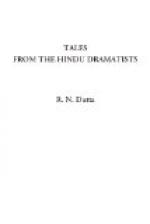At this lamentation of the king, all present become sorry and express their regrets. After a little while, the sage arrives again, his body emitting sparks of fire. Seeing him at a distance, the king begins to tremble.
As the sage comes up, the king bows to him and says,
“My lord Kausika! I have procured only a half of your fee by the sale of my wife. Accept it. I shall presently pay the remaining half by the sale of my own person.”
The sage whirls his eyes and exclaims, “Is it a joke? Am I a fit object for a joke? What shall I do with only half the money? Just pay down the whole amount. See the sun is setting.”
The king replies, “O God! if this does not satisfy you, I pray you wait a little. If a Chandal is available, I will sell my person to him and pay your fee.” The sage remarks:—
“Then I will stand here and wait. Collect the money without delay.”
The king then hawks himself about, “Will any one buy me with half a lakh of gold coins, and deliver me from an ocean of sorrows.” No one responds to his offer. No buyer appears. The sun is about to set. Death stares him in the face. Not that he fears death. Why should he fear it? He has given away his kingdom. His queen has been sold. Life has no further attraction for him. Death has been stripped of its terrors. But death by the fire of a Brahmin’s anger leads to everlasting hell. He sees the vision of hell, falls down on the ground like a plantain tree blown by a tempest, and faints.
Virtue preserves him who practises virtue. Virtue assumes the form of a Chandal and accompanied by an attendant, makes his appearance, with a half-burnt bamboo on his shoulders and a chain of skeletons round his neck. He is ready to buy the king, who now weeps bitterly, and holding the feet of the sage, entreats him thus:—
“Oh lord Kausika! Do me a favour I pray you. Do not sell me to a Chandal. Do you rather buy me. I shall be your slave for ever.”
On this, the sage flies into a rage and exclaims:—
“Oh villain! Do not trifle with me. You have all this time been pretending that you want buyers. As soon as a buyer appears in the field, you feel ashamed to be sold to a Chandal! I cannot brook any more delay. I take up water to destroy you.”
The king begs his pardon, sells himself to the Chandal and pays down the fee to the sage, who then retires.
The king now puts on the dress of a Chandal and is appointed with two others to collect rags in a burning-ground. Hideous is the burning-ground. Dogs and jackals are tearing up carcasses which lie scattered all round. Vultures are quarrelling among themselves. These sights unloosen the bonds that bind him to the world. The king is trembling with fear. His two colleagues have left him. But he will not leave his station. He must do his duty. The night deepens. The burning-ground becomes still more hideous. To




